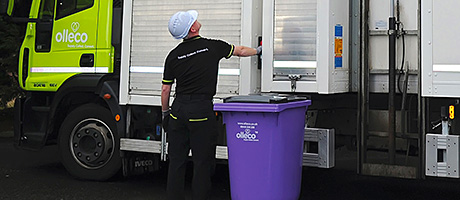Recycling firms say new regulations have alerted operators to the potential benefits of effective waste management

BUSINESSES across Scotland are waking up to the fact that there’s cash to be found among their landfill waste.
As operators adopt new recycling protocols in compliance with the Waste (Scotland) Regulations that came into force on January 1, recycling firms contacted by SLTN said there are ways operators can benefit financially from their waste.
Iain Gulland, director of environmental organisation Zero Waste Scotland, said businesses have realised there is “real value” in waste with some already seeing savings.
“The new regulations have perhaps been more significant for smaller companies who are now beginning to see some substantial cost savings through the new way in which they now manage their waste,” said Gulland.
Landfill tax is set to rise in April, this tax makes up a significant portion of waste bills.
“While the perception is generally that recycling more means spending more, in many cases, businesses will see a minimal change in costs and in fact there can even be additional savings.
“This increasing recognition across Scotland of the financial benefits of separating waste for recycling, rather than having to pay hefty landfill charges, has perhaps been felt most keenly by the hospitality industry.”
If operators wish to avoid landfill charges, some organisation of waste is required.
Lynn Thomson of waste management firm Biffa suggested that assigning a dedicated area for sorting waste “will make life a lot easier”.
“Separating materials at source increases the quality of your recycling and also saves you time in the long run,” said Thomson.
“Communicating any changes to your staff is also critical; take the time to explain the new system to everyone responsible for disposing of waste and work together to iron out any problems.
“Once the new system is up and running it will be easy, so it’s worth taking the time to get it right at the beginning.”
Vincent Igoe of recycling firm Olleco agreed that it is important to get staff on board with the new regulations, as mistakes in implementing the business’s food waste protocols could prove costly.
“As with any organisational change, it can take time for staff to get on board and get used to the new regulations,” he said.
“If a dry waste bin is contaminated with food waste, then the waste will not be collected and recycled and, as a result, the organisation will have to pay for additional/separate collections for this waste, and likely incur a fine for contaminating the bin.”
If operators want the best chance at compliance then they should take stock of where waste is produced on their premises, said Robin Stevenson of recycling firm William Tracey Group.
“The key to good recycling is to make it easy,” said Stevenson. “If people see it as an inconvenience then all too often recyclable material simply ends up in the nearest bin.
“To do this it is important to understand how a premises operates, where different waste types are being produced and in what volumes.”
Over and above the legal cost, Stevenson highlighted the growing price of disposing of unsorted waste.
“There are some sound business reasons (as well as the obvious environmental ones) for taking this opportunity to review your premises’ recycling facilities,” said Stevenson.
“Landfill tax is currently at £72 per tonne and set to rise to £80 per tonne in April. This tax makes up a significant proportion of any business’s waste bill.
“Any material you can separate out from the general waste so it can be recycled avoids landfill tax and can therefore play an important part in managing your future waste costs.”
Recycling isn’t the only way to lower waste management costs, however.
Mark McGowan, sales manager at recycling equipment firm MT Waste Management, suggested operators look at waste reduction equipment as a means of lowering costs.
“Particularly relevant within the pub, club, restaurant and hotel industry are the processes that can be put in place to reduce waste on site before it is lifted by the bin,” he said.
“Companies are using solutions such as machinery or ‘waste to energy’ systems that can be used to fuel your business on a day to day basis.
“This can slash both the costs of waste management and energy bills for the business.”























